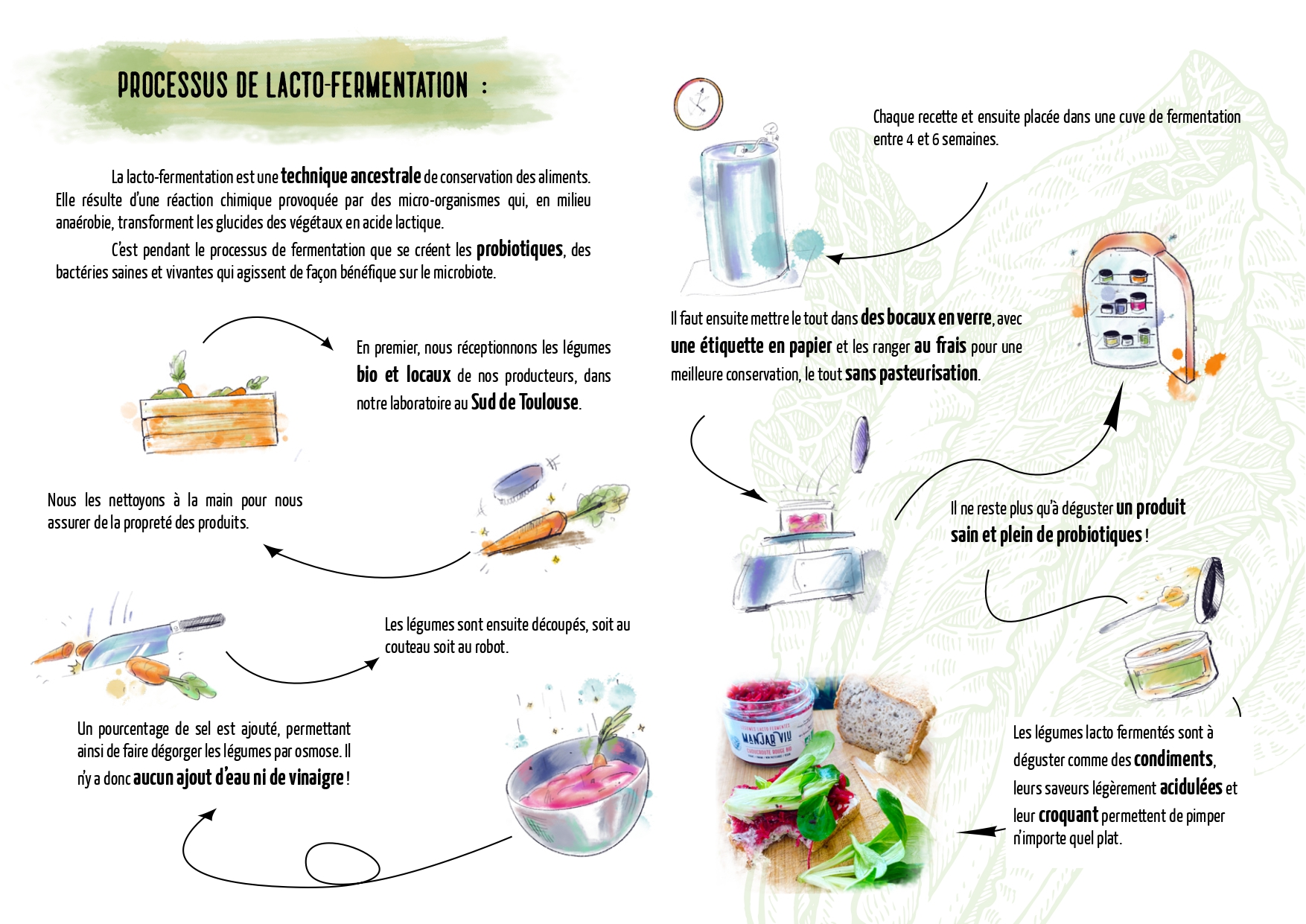- Out-of-Stock















Lacto-fermented beet and white cabbage with cumin
Certified organic
Unpasteurized
Handcrafted in France
400 g glass jar
We are thrilled to introduce MANJAR VIU's organic, non-pasteurized lacto-fermented products ("Eating Alive" in Occitan)!
⚛️ Made from organic, locally-sourced lacto-fermented beetroot and white cabbage, this tasty blend, enhanced with cumin, is artisanal, carefully prepared, and unpasteurized. It is a unique way to combine vitality and practicality in your meals.
> Free from preservatives, artificial flavors, or vinegar (which is antiseptic), you'll add a boost of pre- and probiotics to your dishes with just one or two tablespoons of this preparation! (If it makes a "pssst" sound upon opening, that's normal—it's a living product!)
> Enjoy as a condiment! The unique slightly tangy flavors and crunch of lacto-fermented vegetables can indeed enhance any meal! Behind this jar of lacto-fermented vegetables lies a gustatory adventure and an explosion of authentic flavors with every bite: the cumin flavor pleasantly elevates the recipe, while the richness of the umami taste brings a uniquely satisfying sensation!
⚛️ How to enjoy this jar of lacto-fermented vegetables?
Lacto-fermented vegetables can be used as a side for salads, in wraps, makis, or on crackers. These condiments will instantly elevate your dishes, salads, appetizers, toasts, sandwiches, and soups!
> Non-pasteurized, allowing you to enjoy the benefits of lacto-fermentation. Always use clean utensils and keep the jar refrigerated (consume within a month after opening).
> Ensure better preservation by pressing down leftover vegetables into their brine. The brine can also be used in sauces, dressings, or fresh vegetable juices! We recommend consuming a small amount of lacto-fermented vegetables daily (ideally one to two tablespoons per meal) rather than basing an entire meal on this food.
⚛️ What is umami flavor?
Umami is the fifth taste detected by the tongue after salty, sweet, sour, and bitter. Often described as a savory delight that deepens flavor, it’s the famous "come back for more" taste! Umami is often associated with a sense of roundness and depth in taste, increasing satisfaction and complexity in dishes.
> This flavor was first identified in 1908 by scientist Kikunae Ikeda, a professor at Tokyo Imperial University. He noticed it while studying kombu dashi (seaweed broth) and isolated the responsible molecule: glutamate. He named this flavor "umami": "uma" meaning "savory" and "mi" meaning "taste."
> Umami is found in foods like ripe tomatoes, mushrooms, and seaweed. Its exploration continues to revolutionize how we perceive and enjoy food. Chefs and nutritionists value umami for its ability to balance and harmonize other flavors in a dish.
> Consuming foods rich in umami can stimulate salivation, improving digestion. Additionally, fermented foods, often high in umami (like miso), provide probiotic benefits, supporting gut health.
> Invented around 10,000 years before refrigerators and industrial processes, many countries worldwide have developed lacto-fermented vegetable recipes: sauerkraut in Europe, kimchi and miso in Asia, cereals and legumes in Indonesia, etc.
> It results from a chemical reaction caused by specific yeasts, bacteria, or fungi that, in an anaerobic environment (without oxygen), transform plant sugars into lactic acid. The environment becomes progressively acidic, preventing the growth of other organisms.
> This method has no link to lactose. Its name comes from the involved bacteria, called lactic bacteria or lactobacilli, which are not milk-derived. Lactic acid is a natural preservative that inhibits the growth of pathogenic bacteria and germs that could spoil vegetables. The vegetables retain all their vitality, or even more!
> Fermentation is an effective preservation method and a culinary art offering a wide range of surprising textures and flavors. It is also an ancestral food preservation process requiring various stages and regular monitoring to achieve the best quality final product.
> Fermented foods are known to boost the immune system, support gut flora, and aid digestion. They improve digestion, provide probiotics, and enhance nutrient bioavailability.

⚛️ To learn more, check out our blog articles:
Lacto-fermentation: A True Health Asset!
What Are the Benefits of Fermented Foods?
Lacto-fermentation reveals the flavors of foods and promotes intestinal microbiota balance. The vegetables remain alive, are easier to digest, detoxifying... and delicious!
⚛️ The main benefit of lacto-fermented vegetables is their high concentration of probiotics. These beneficial bacteria enrich, regulate, and balance your gut flora. With their help, you can restore good intestinal health, and as we know, the digestive system is our second brain! Taking care of it with probiotics improves numerous bodily functions.
⚛️ Lacto-fermentation is therefore a process of multiplying nutrients through microcosmic living activity. Bacteria, enzymes, and yeasts transform simple sugars into organic acids, proteins into amino acids, and greatly enhance vitamins and digestibility.
Lacto-fermented foods have several health advantages:
> They are rich in active compounds and micronutrients (notably high in vitamins C, B12, and B3). For instance, cabbage turned into sauerkraut sees its vitamin C content soar by up to 300%!
> They facilitate nutrient absorption. Without the help of bacteria, many proteins, complex sugars, and vitamins would reach the end of the digestive tract in an "undigested" state, meaning these molecules wouldn't have been sufficiently broken down during digestion and would be too complex to cross the intestinal membrane and be absorbed by the body!
> They are rich in enzymes, highly digestible, and promote the growth of healthy bacteria in the intestines.
> They contain acids that ensure detoxification functions and play an antibiotic and preventive role against degenerative diseases.
⚛️ To learn more about the benefits of lacto-fermentation, check out our blog articles:
> What Are the Benefits of Fermented Foods?
> Lacto-fermentation: A True Health Asset!
Located in Lahage, near Toulouse, within the Bordanova third place, Mathieu, the mastermind behind Manjar Viu, specializes passionately and diligently in vegetable lacto-fermentation. Collaborating with local organic farmers, his company ensures fast and direct delivery of vegetables without intermediary storage. Production follows the rhythm of the seasons, accepting all shapes and sizes of vegetables to minimize food waste and transportation emissions.
Manjar Viu's products are natural, free from preservatives or vinegar, allowing fermentation to continue during storage.
⚛️ We had the pleasure of meeting Mathieu in October 2024; watch our interview with him in this video:
⚛️ Additionally, Mathieu, with a culinary background, became passionate about food preservation, finding lacto-fermentation ideal for its ecological benefits and longevity. Through Manjar Viu, he aspires to offer nutritious and delicious recipes while highlighting local cultures. He also published a recipe book in September 2022, titled “Do Yourself Good, Eat Alive,” to promote the daily use of lacto-fermented vegetables, including this excerpt:
"Today, in a constantly changing world filled with uncertainty, a sterilized, polluted world increasingly deprived of nutrients, my aim with this project is to offer flavorful and healthy recipes to boost vitality."
Ingredients: Beetroot* (65.6%), white cabbage* (32.8%), salt, and cumin*
*ingredients sourced from organic farming.

Packaging: Available in glass jars of 400g
Best Before Date (BBD): Consume within one month after opening.
Storage instructions: Keep refrigerated between 4 and 8 degrees Celsius.
| Average Nutritional Values | Per 100 g |
Energy | 36.8 Kcal |
| Carbohydrates (of which sugars): | 8.2 g 4 g |
| Fiber | 9.5 g |
| Protein | 1.5 g |
| Salt | 1.5 g |
Ces produits pourraient vous intéresser
Organic lacto-fermented celeriac and a...